Salih al-Munajjid

In the Name of Allâh, the Most Beneficent, the Most Merciful
He was born in 1381 AH. He completed his elementary, middle and secondary schooling in Riyadh, and completed his university studies in al-Dahran, in the Kingdom of Saudi Arabia. He attended the classes of Shaykh Abd al-Azeez ibn Abd-Allaah ibn Baaz, Shaykh Muhammad ibn Saalih al-Uthaymeen and Shaykh Abd-Allaah ibn Abd al-Rahmaan al-Jibreen; they were the shaykhs from whom he learned the most. He also studied under Shaykh Abd al-Rahmaan ibn Naasir al-Barraak and Shaykh Muhammad, the son Seedi al-Habeeb al-Shanqeeti. He learned the recitation of the Quraan from Shaykh Saeed Aal Abd-Allaah. Among his shaykhs from whom he learned were also Shaykh Saalih ibn Fawzaan Aal Fawzaan, Shaykh Abd-Allaah ibn Muhammad al-Ghunaymaan, Shaykh Abd al-Muhsin al-Zaamil and Shaykh Abd al-Rahmaan ibn Saalih al-Mahmood.
Interactions Of The Greatest Leader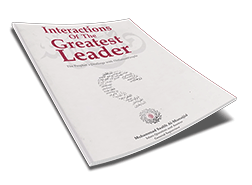
Muhammad Salih al-Munajjid
Allaah sent His Messenger Muhammad, sallallaahu ‘alayhi wa sallam, to all of creation as a witness, a bringer of glad tidings of Paradise to those who accept the Path he calls to and a warner against the wrath of Allaah. He sent him to invite to the religion of Allaah, by His permission, and as an illuminating lamp to light the Path of survival, the Path of Allaah. Allaah sent him with guidance and mercy and the true religion, and to guide people to what results in their happiness in this world and the Hereafter. This is the reward for those who believe in him, love him and follow his path, sallallaahu ‘alayhi wa sallam.
|
The Muslim Home: 40 Recommendations
Muhammad Salih al-Munajjid
Home is the place where you and your family spend most of the time. Therefore, it should be decent and comfortable. In order to be so, it must be based on intimacy, love, sincerity, truthfulness, honesty, and the like. All these concepts and others are just applications of the Islamic principles.
This booklet presents the necessary advice about building up such a home. Acquiring this information would enable you to make of your home the most enjoyable place for yourself and your family. |
The Prophet's Methods Of Correcting People's Mistakes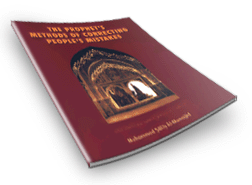
Muhammad Salih al-Munajjid
There are many teaching methods with different means and aids. Correcting mistakes is one of these teaching methods and educationalists call is the "remedial method." Correcting people's mistakes is essential if teaching people is the aim. Correcting mistakes is a divine method the Prophet (pbuh) practiced as the Qur'an was sometimes revealed to correct some mistakes of the Sahabah (companions of the Prophet). The Prophet (pbuh) was divinely guided in correcting the mistakes of people. So his methods are the best mankind has ever known. Following the example of the Prophet (pbuh) is therefore the best approach if one is really keen to teach Islamic knowledge and all the other branches of knowledge. The author has in this book compiled many methods of the Prophet (pbuh) for teaching people and correcting their mistakes. This book, as such, is indispensable for everyone who is concerned with education in general, and Islamic knowledge in particular.
|
Dealing with Worries and Stress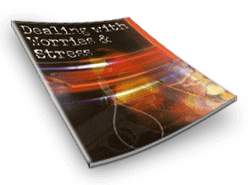
Muhammad Salih al-Munajjid
It is the nature of this life that people will suffer from worries and stress, because this world is the place of disease, hardship and suffering. It is also the nature of this life that people have to put with suffering and hardship for various reasons. So people feel regret for what has happened in the past, anxious about that may happen in the future, and worried about what is going on in the present. The things that cross our mind and make us feel distressed are things in the past that have caused grief, things in the future that we are worried about, and things in the present which concern us.
People react differently to stress and worries, depending on how many things are concerning them, whether the worry is continuous or not, and on whether they have faith in their hearts or are rebellious and sinful. We may describe people's hearts as being of two types: either the heart is the throne of Allaah, filled with light, life, happiness, joy and all the treasures of goodness; or it is the throne of Shaytaan, wherein is distress, darkness, death, grief, worry and anxiety. |
33 Ways of developing Khushoo in Salaah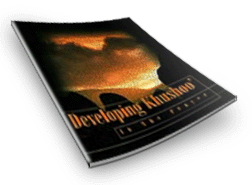
By Sheikh Muhammed Salih Al-Munajjid
Salaah is the greatest of the practical pillars of Islam, and khushoo in prayer is required by shareeah. When Iblees, the enemy of Allaah, vowed to mislead and tempt the sons of Adam and said Then I will come to them from before them and behind them, from their right and from their left [al-Araaf 7:17, interpretation of the meaning], one of his most significant plots became to divert people from salaah by all possible means and to whisper to them during their prayer so as to deprive them of the joy of this worship and cause them to lose the reward for it. As khushoo will be the first thing to disappear from the earth, and we are living in the last times, the words of Hudhayfah (may Allaah be pleased with him) are particularly pertinent to us: The first thing of your religion that you will lose is khushoo, and the last thing that you will lose of your religion is salaah. There may be a person praying who has no goodness in him, and soon you will enter the mosque and not find anyone who has khushoo. (al-Madaarij, 1/521).
|
I Want to Repent, But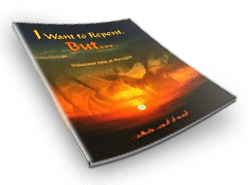
By Sheikh Muhammed Salih Al-Munajjid
based on the Noble Qur'an and the Honorable Sunnah, quoting many verses and hadiths confirming that Allah's mercy and forgiveness embrace all things, and are greater than all sins.
|
Weakness of Iman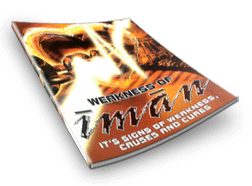
Muhammad Salih al-Munajjid
The phenomenon of weak faith has become very widespread among Muslims, and many people complain about the hardness of their hearts. So often we hear the words, I feel hardness in my heart, I do not find any joy in worship, I feel that my faith has hit rock bottom, Reading Quraan does not move me, I fall into sin so easily. The effects of this affliction can be seen in many people, and this problem is the cause of every disaster and adversity.
|
Forbidden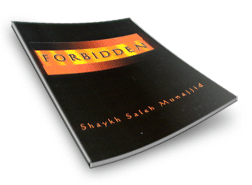
The Forbidden, Issues Of Great Importance That We Underestimate. Al-Muharramat (the forbidden) are the limits of Allaah (the Mighty and Magnificent). "These are the limits of Allaah, so do not approach them". . Allaah has threatened whoever transgresses His limits and violates His sacraments stating (Glorified be He): "And whoever disobeys Allaah and His messenger and transgresses His limits - He will put him into the fire to abide eternally therein, and he will have a humilating punishment." It is obligatory to avoid al-muharramaat in view of the saying of the prophet: "And whatever I forbade you, then avoid it and whatever I enjoined upon you, then fulfill as much of it as you able." I ask Allaah guidance, success, and observance of His limits for myself and for my Muslim brothers. I ak Him (Glorified be He) to help us avoid al-muharramaat and protect us from sins and evil deeds, Allaah is the best protector and He is the Most Merciful (Author)
|
Bid'ah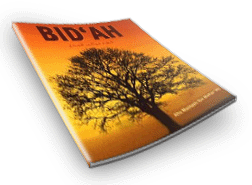
By Sheikh Muhammed Salih Al-Munajjid. It is narrated on the authority of the Mother of the Believers, Umm 'Abdullah 'Aishah, radiyallahu 'anha, that the Messenger of Allah, sallallahu 'alayhi wasallam, said: "Whosoever introduces into this affair of ours (i.e. into Islam) something that does not belong to it, it is to be rejected." [Al-Bukhari & Muslim]
|
Ruling On Celebrating The Birthday Of The Prophet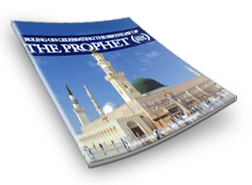
The subject of celebrating the Prophets' (peace be upon him) is a hotly disputed one. In this book Sheikh Muhammed Salih Al-Munajjid gives the ruling on this widespread practice.
|
Ruling on celebrating the middle of Shabaan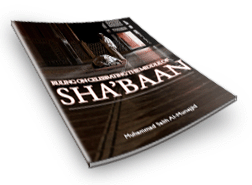
There are some hadiths that speak about the Middle of Sha`ban and its night. However, the scholars of hadith say that most of the hadiths concerning this night are not authentic. They are weak (da`if) according to the criteria of the narrators and scholars of hadith. In this book Sheikh Muhammed Salih Al-Munajjid takes us through these hadith giving rulings on their authenticity.
|
Celebrating Valentines Day
By: A book by Sheikh Muhammed Salih Al-Munajjid focusing on the history of valentines day and the permisibility of muslims celebrating it.
|
Rulings of Udhiyah Sacrifice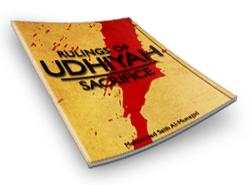
By: Udhiyah refers to the animal (camel, cattle or sheep) that is sacrificed as an act of worship to Allaah, in the country in which the person offering the sacrifice lives, during the period from after the Eid prayer on the Day of Nahr (Eid al-Adhaa) until the last of the Days of Tashreeq (the 13 th day of Dhul-Hijjah), with the intention of offering sacrifice. Udhiyah is one of the great rituals of Islam, in which we remember the Unity of Allaah, His blessings upon us and the obedience of our father Ibraaheem to his Lord, and in this act of udhiyah there is much goodness and blessing. So the Muslim must pay attention to its great importance. This book is a brief look at this important ritual.
|
Matters Related to Fasting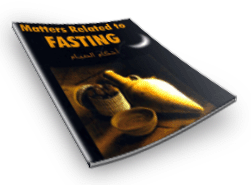
by Sheikh Muhammed Salih Al-Munajjid. Allah has blessed His slaves with certain seasons of goodness, in which hasanat (rewards for good deeds) are multiplied, sayyi'at (bad deeds) are forgiven, people's status is raised and the hearts of the believers turn to their Lord. Those who purify themselves attain success and those who corrupt themselves fail. One of the greatest acts of worship is fasting, which Allah has made obligatory to his slaves. As the status of this act of worship is so high, it is essential to learn the Ahkam (rulings) that have to do with the month of fasting, so that the Muslim will know what is obligatory, in order to do it, what is haram, in order to avoid it, and what is permissible, so that he does not need to subject himself to hardship by depriving himself of it. This book is a good summary of the rulings, etiquettes, and Sunnah of fasting.
|
Zakat al-Fitr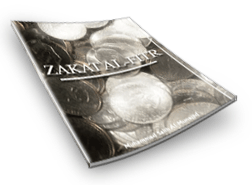
By Muhammad Salih Al-Munajjid. This short book explains the necessity for the proper collection and distribution of Zakat.
|
Benefits From Surah Yoosuf
Author: Muhammed Salih Al-Munajjid | Pages: 10 | Size: 1 MB
This book is an adaption of a friday khutbah given by Sheikh Muhammed Salih Al-Munajjid which explains the fruits that can be taken from the life of prophet Yoosuf (may Allah be pleased with him). This chapter Yoosuf relates to the story of one of the noble prophets, peace be upon him, and includes great admonitions and numerous benefits for the believers, as well as Islaamic rulings which the scholars of Islaam have extracted from this wonderful story that Allaah revealed to His Prophet Muhammad sallallaahu 'alayhi wa sallam. The story of Prophet Yoosuf, peace be upon him, has a distinct, beautiful style, and neither the Jews nor the Christians have anything like it in their books, especially in such detail.
|
Why Allah (swt) Decrees Wars and Catastrophes
There is a wisdom behind everything that appears evil; wars, poverty, diseases, famine, earthquakes, volcanoes, and even the existence of disbelief upon the earth; when people kill each other, it happens for a reason. There is wisdom behind everything, even the creation of Satan, which only the people of knowledge can comprehend. This book is an adaption of a Friday Jummah Khutbah given by Shaykh Muhammed Salih Al-Munajjid dealing with the wisdom behind Allah's (swt) decree.
|
Reflection Upon The Current Crusade War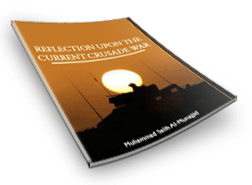
Indeed, Allaah responds to the supplications of Muslims. More often than not, Muslims raise their hands in prayer, during trials and disasters which inflict some Muslim countries, like in the period we are living now. How many times did the Muslims invokeAllaah? How many old men and women beseech Allaah, with humbleness? This book is an adaption of a friday khutbah given by Sheikh Muhammed Salih Al-Munajjid that makes a clear distinction between our dua and Alllahs help in whatever shape or form Allah (swt) sees best.
|
Love Of Allah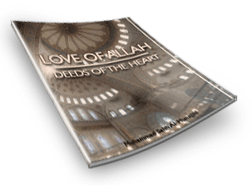
Love of Allah is life itself, and to be deprived of it entails a terrible death; it is the light without which one would sail in a sea of darkness; it is the cure without which one's heart will be overwhelmed by a multitude of diseases; it is the joy without which one will remain in permanent grief; it is the essence of faith and deeds, without which they become like a soulless body.
|







0 Comments